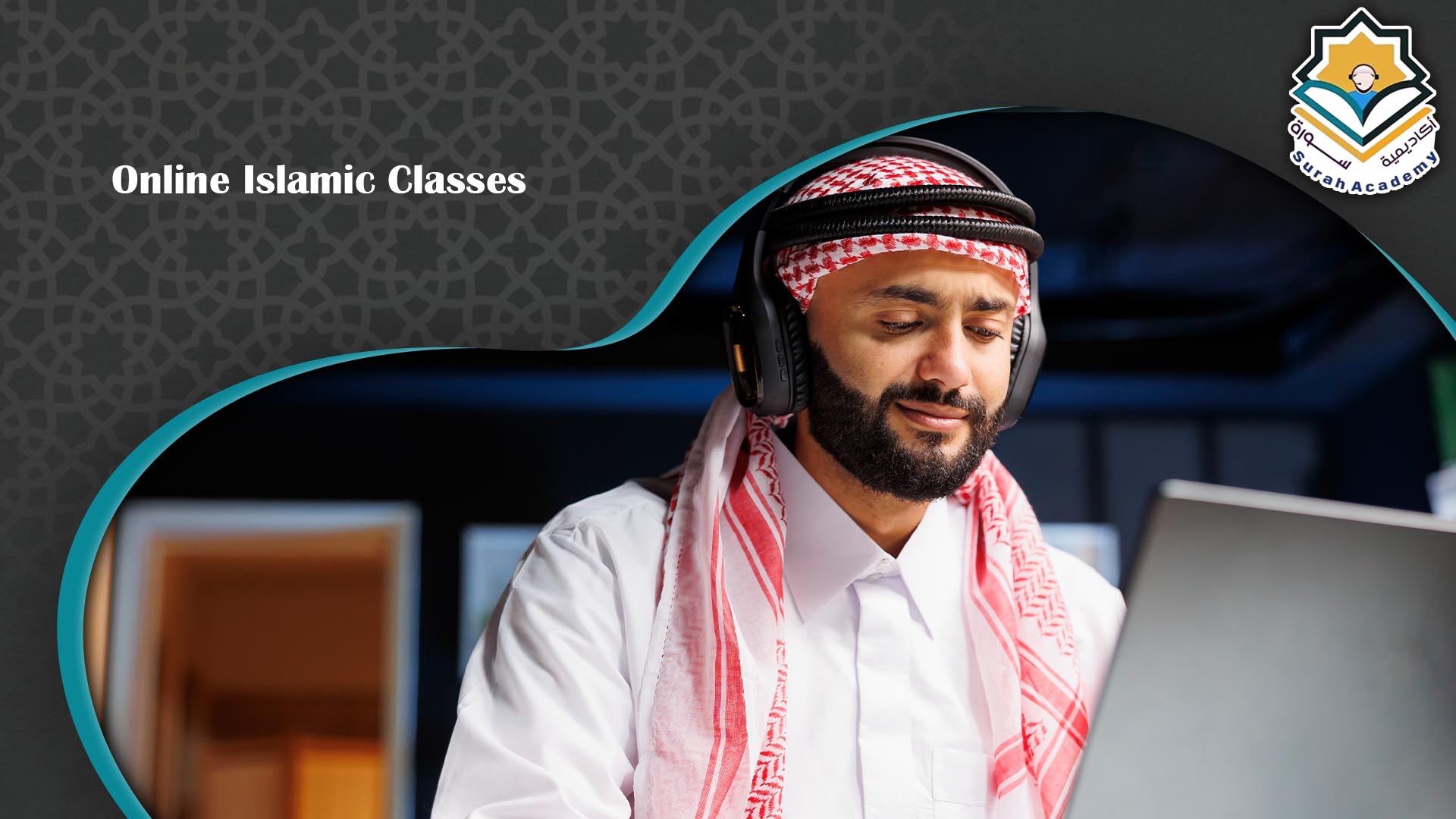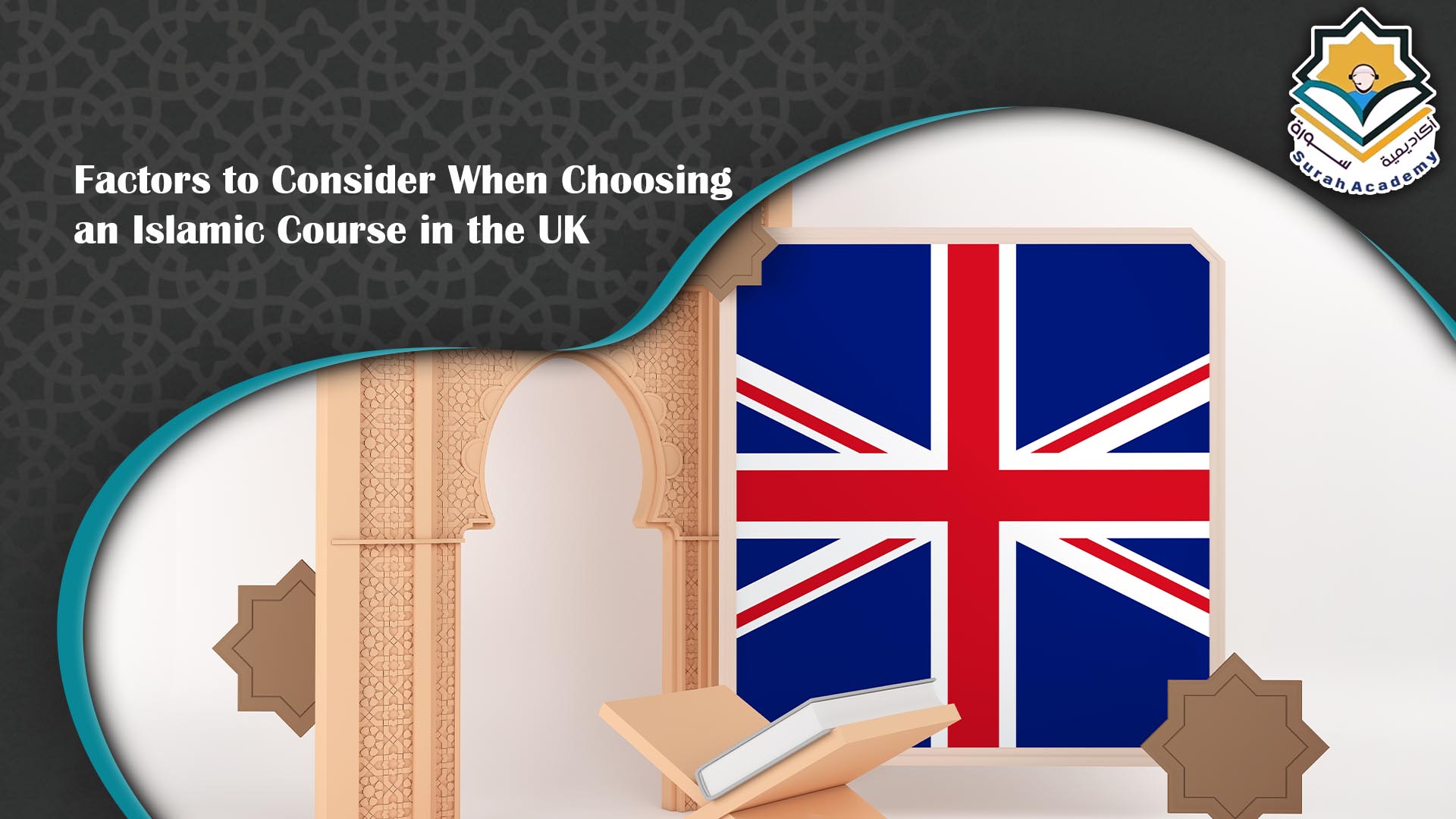Islamic Classes at Surah Academy offer a transformative journey for individuals seeking to deepen their understanding of Islam, strengthen their faith, and apply its teachings in daily life. Through structured lessons on the Quran, Hadith, Fiqh, and Islamic history, these classes cater to learners of all ages and backgrounds.
They provide not only religious knowledge but also moral guidance, fostering a sense of spiritual growth and community connection. Whether taken online or in person, Surah Academy’s Islamic classes serve as a bridge between knowledge and practice, empowering students to live according to Islamic values with confidence and clarity.
Online Islamic Classes

Islamic Classes is an international academy offering online Quran and Islamic education for children and adults worldwide. At IslamicClasses.com and Surah Academy, students learn Quran with Tajweed from expert tutors using the latest technology in a comfortable environment. Our mission is to widely spread the teachings of Islam through effective teaching methods. The platform is ideal for those who cannot attend mosque or lack nearby Islamic institutes.
We offer live one-on-one lessons and a free trial of 3 classes. Since 2010, we have helped thousands complete their Quran and basic Islamic studies while continuously improving our services.
Begin Your Tajweed Journey with Surah Academy
Unlock the beauty of Quranic recitation with Surah Academy’s expert-led online Tajweed courses. Whether you’re just starting out or aiming to enhance your recitation skills, our interactive and flexible classes are designed to fit your schedule and level. Learn from qualified instructors and experience the transformative power of reciting the Qur’an as it was meant to be heard.
Enroll today and take your first confident step toward mastering Tajweed.

Benefits of islamic classes for Children
Choosing the right school is one of the most important decisions that shapes a child’s growth and future. For Muslim parents, it is essential to find an educational environment that promotes both academic success and spiritual development. Islamic schooling offers a unique blend of religious and secular education, helping to raise well-rounded individuals with strong identity, stable values, and good morals. At Mehria Primary School, Luton, we believe that Islamic education is a priceless investment in a child’s life. In this article, we will explore the top benefits of Islamic schooling and why it could be the perfect choice for your child.
1. Holistic Education: Balancing Faith and Knowledge
One of the greatest strengths of Islamic schooling is its holistic approach to education. Instead of separating religious studies from academic learning, Islamic schools weave both together, ensuring that students can see the connection between their faith and the world around them.
For example, science lessons may highlight the wonders of Allah’s creation, while literature classes may explore themes of morality and justice. This integrated method helps children develop a well-rounded worldview where their religious beliefs guide their understanding of life’s challenges and opportunities.
2. Instilling Strong Moral Values and Character
In a world where moral boundaries are often blurred, Islamic schools stand out for their commitment to character building. From the earliest years, children are taught the values of honesty, kindness, respect for elders, compassion for others, and a sense of responsibility towards society.
These values are not taught as abstract concepts — they are reinforced daily through classroom interactions, school activities, and the behavior of teachers who serve as role models. Over time, these lessons become part of the child’s personality, helping them navigate life with integrity and moral clarity.
3. Strengthening Muslim Identity
Maintaining a strong Muslim identity in a multicultural and sometimes challenging environment can be difficult for young people. Islamic schools address this by creating an atmosphere where students can practice their faith confidently.
Daily prayers, Quran recitation, and learning about Islamic history give children a sense of pride in their heritage. Surrounded by peers who share their beliefs, students feel less pressure to compromise their values, which boosts their self-confidence and resilience in the wider world.
4. Deep Understanding of Islam
Beyond simply memorizing facts, Islamic schooling encourages students to understand the principles of Islam and how to apply them in everyday life. Lessons on the Quran, the Sunnah of Prophet Muhammad (PBUH), and Islamic jurisprudence provide a strong foundation for making ethical decisions.
This knowledge is not only spiritually enriching but also practical — it guides students in everything from how they treat others to how they approach their studies and future careers.
5. A Value-Based Curriculum
Islamic schools carefully design their curriculum to meet national academic standards while maintaining a clear moral compass. At Mehria Primary School, subjects like mathematics, science, and English are taught alongside Islamic studies, ensuring that students are academically competitive while grounded in faith.
Teachers incorporate Islamic values into their lessons, helping children understand that faith is not separate from life — it’s a guiding principle in all aspects of learning and decision-making.
6. Safe and Nurturing Environment
Islamic schools emphasize discipline, respect, and modesty, creating a safe space where children can learn without fear of bullying or negative peer pressure.
The environment is carefully structured to support the physical, emotional, and spiritual well-being of every student. This not only protects children but also allows them to focus entirely on their education and personal growth.
7. Strong Community Bonds
One of the often-overlooked benefits of Islamic schooling is the strong sense of community it fosters. Parents, teachers, and students form a supportive network united by shared beliefs and goals.
This sense of belonging creates a positive environment where students feel supported both at school and at home. Parents also benefit, knowing their children are surrounded by positive role models who reinforce the same values taught in the family.
8. How Islamic Schools Differ from Public Schools
Public schools may offer a broad range of academic programs, but they often lack the tailored approach that addresses the specific needs of Muslim students. In contrast, Islamic schools integrate academic excellence with spiritual guidance, ensuring students receive both a strong education and a firm moral foundation.
At Mehria Primary School, for example, students receive the same quality of education found in top public schools — but with the added benefit of daily Islamic studies, prayer times, and moral education.
9. Preparing Children for Life Beyond School
Islamic education equips students not just for exams, but for life itself. Graduates of Islamic schools often display a strong work ethic, empathy for others, and the confidence to uphold their beliefs even in challenging situations.
They are encouraged to view learning as a lifelong journey, to serve their communities, and to contribute positively to society while staying true to their faith.
10. The Mehria Primary School Difference
At Mehria Primary School, Luton, our mission is to nurture both the mind and the soul. We believe that every child has the potential to achieve excellence in academics and spirituality alike. Our teachers are not only qualified educators but also dedicated mentors who guide students toward becoming confident, compassionate, and capable individuals.
We provide a safe, inspiring, and value-driven environment where children can thrive — academically, socially, and spiritually.
Learn more: how to perform wudu
The Importance of Islamic Education
Islamic education extends far beyond the mere instruction of religious texts. Its primary goal is to nurture a profound sense of purpose, moral accountability, and a deep-rooted connection to one’s spiritual identity. Within Islam, seeking knowledge is considered a noble act of worship, emphasized repeatedly in the Qur’an and authentic Hadith, which encourage lifelong learning and reflection. Consequently, Islamic education not only involves understanding core religious principles but also focuses on cultivating essential virtues such as compassion, honesty, integrity, and justice.
In the United Kingdom, where Muslims constitute a significant and growing part of the population, Islamic education serves as a crucial bridge linking younger generations to their rich cultural and religious heritage. Amid rising secularism and the complexities of multicultural integration, Islamic schools and madrasas provide a supportive and safe environment where Muslim children can develop a strong sense of identity while receiving rigorous, high-quality academic instruction. This balanced approach, combining spiritual growth with educational excellence, equips students with the knowledge, skills, and confidence needed to succeed in diverse careers and contribute meaningfully to both their communities and broader society.
Empowering the Future: The Impact of Islamic Education
The significance of Islamic education in empowering future generations cannot be overstated. By providing young Muslims with a solid foundation in both religious knowledge and academic excellence, Islamic schools and madrasas prepare them to thrive in an increasingly multicultural and rapidly changing world. These institutions play a vital role not only in preserving Islamic identity but also in fostering a strong sense of civic responsibility and global citizenship.
Furthermore, the core values embedded through Islamic education—such as compassion, honesty, and justice—are universally applicable, equipping students to make positive contributions both within the Muslim community and in broader society. As Islamic education continues to advance and adapt in the UK, it will remain pivotal in shaping a generation of confident, well-informed, and morally grounded individuals ready to lead and serve in diverse roles.
In summary, Islamic education in the UK empowers the next generation of Muslims by nurturing their intellectual, spiritual, and ethical development. Whether through traditional madrasas, full-time Islamic schools, or modern digital learning platforms, the future of Islamic education is promising, offering young people the essential tools to succeed in both their faith and the contemporary world.
Read also: Learn Quran
Three Stages for Studying Islam
To facilitate clear understanding and effective tracking of students’ progress, the curriculum for adult Islamic classes is organized into three distinct levels.
Stage 1: This initial stage focuses on foundational material, enabling students to build a strong routine by mastering the basics. After approximately 25 hours of structured study, learners will undergo an evaluation to assess their comprehension of the fundamental concepts.
Stage 2: Depending on the chosen course, this intermediate stage covers slightly more advanced topics. It requires around 35 hours of study, followed by a reassessment to measure the student’s level of understanding. Assessment methods vary by course; some use subjective evaluations while others apply objective testing.
Stage 3: The final stage of any Islamic course typically involves 45 to 50 hours of study and delves into more complex and in-depth subjects. This phase emphasizes the detailed understanding and practical application of tools such as infographics and other educational resources, challenging students to consolidate and expand their knowledge.
What Will You Study in the Islamic Classes for Adults?
Discover a comprehensive range of well-structured Islamic courses online, designed to provide you with essential knowledge and insights tailored to your learning needs. Whether you seek foundational understanding or deeper study, these courses cover various important aspects of Islam, including:
1-Aqeedah Course
Faith (Aqeedah) forms the cornerstone of a Muslim’s life. This course guides learners on the path toward spiritual enlightenment and a profound understanding of Allah. It lays down the fundamental beliefs of Islam, enhancing your overall knowledge of the religion.
Topics covered include:
- -Belief in Allah
- Belief in Angels
- Belief in Divine Scriptures
- Gratitude for the Prophets
- Belief in the Afterlife
- Faith in Al-Qadar (Divine Decree and Predestination)
- Names and Attributes of Allah
- Types of Shirk (Polytheism)
2- jurisprudence Course
This course explores Islamic jurisprudence based on the Quran and Sunnah, providing practical knowledge of religious rulings and daily obligations.
Subjects include:
- The Fiqh of the Five Pillars of Islam.
- Islamic rulings on marriage and divorce, including contracts and rights.
- Laws of inheritance and the distribution of wealth under Islamic law.
- Rules of purification (Taharah).
- Islamic customs relating to birth and death.
3-Islamic Classes for Adults
Our classes provide an immersive experience into the meanings and teachings of the Quran, enhancing your understanding and connection to the Holy Book. Course highlights include:
- Quranic recitation with a focus on the Ten Qira’at (modes of recitation).
- Memorization of the Quran.
- Learning Noorani Qaida to read the Quran correctly.
- Rules of Tajweed (proper pronunciation).
- Tafseer (interpretation and deeper understanding of the Quran).
4-Seerah Course
Embark on a journey through the life of Prophet Muhammad (PBUH) in this essential course that unveils his biography and Sunnah through three key stages:
- The Period Before Prophethood.
- The Life of Muhammad: A Historical Account.
- The Period After Prophethood.
5-Hadith Classes
Expand your knowledge through the study of Hadith — the sayings and teachings of Prophet Muhammad (PBUH) — by exploring authentic collections, including:
- Sahih al-Bukhari.
- Sahih Muslim.
- Sunan an-Nasa’i.
- Sunan Abi Dawud.
- Jami’ at-Tirmidhi.
- Sunan Ibn Majah.
- Riyad as-Salihin.
Join our Islamic history classes at suraha cademy to learn about the fascinating stories, transformations, and achievements that continue to inspire the Muslim world today.
Tips for Making Islamic Classes Engaging for Students
Engaging students in Islamic studies requires thoughtful approaches that connect teachings with their daily lives, encourage participation, and nurture a supportive learning environment. Below are practical strategies to make Islamic classes both meaningful and captivating for learners of all ages.
1-Make Lessons Relevant to Students’ Lives
Students engage more deeply when they see the practical applications of Islamic teachings in their own experiences. For example:
When teaching Fiqh topics like Salah, discuss real-life situations such as managing prayer times during a busy school day and the different rewards associated with preferred and disliked prayer times (waqt al-fadilah vs. waqt al-karahah).
While explaining Qadr in Aqidah, present it as a thoughtful study of faith, highlighting how trials—like those faced by Muslims in Gaza or Syria—serve as tests that strengthen belief, referencing Surah Al-‘Ankabūt (29:2):
“Do people think once they say, ‘We believe,’ that they will be left without being put to the test?”
By connecting these lessons to contemporary realities, students appreciate Islamic knowledge as relevant and essential.
2-Incorporate Interactive Activities
Interactive methods energize learning and help students retain information. Integrate these activities into your lesson plans, such as those provided by Diwan’s premade materials:
Role-play significant Islamic events like the migration to Medina or the Treaty of Hudaybiyyah.
Facilitate group discussions on modern challenges, like preserving Islamic identity today.
Assign creative projects, such as mapping intellectual centers in the Muslim world after 100 AH or comparing economic models in Aqidah lessons.
Planned interactions promote critical thinking and deeper engagement.
3-Foster a Sense of Community and Belonging
A supportive classroom atmosphere boosts student confidence and participation:
Organize small group or team activities to share ideas and insights.
Encourage mentorship by pairing older and younger students for guidance.
Following the example of Prophet Muhammad ﷺ, who nurtured community and entrusted companions with meaningful roles, teachers can build inclusive environments where every student feels valued.
4-Break Down Complex Topics
Islamic studies often involve detailed and nuanced concepts. Make them manageable by:
Dividing topics into clear segments, for instance, when teaching Salah: start with its importance in Quran and Sunnah, then explain conditions (shurut), pillars (arkan), and finally recommended Sunnah practices, guiding students toward Ihsan (excellence).
Using structured outlines and clear objectives in each lesson.
This step-by-step approach builds confidence and comprehension.
read more: 5-pillars of islam
5-Provide Constructive Feedback
Motivate students through positive and supportive feedback:
Replace criticism like “You got this wrong” with encouraging phrases such as “You’re almost there! Let’s review this together.”
Recognize effort and progress, no matter how small, to boost morale.
Such feedback helps students view Islamic learning as a safe and rewarding journey.
6-Utilize Visual and Multimedia Tools
Enhance lessons with visual aids to accommodate diverse learning styles:
Use videos or animations to bring historical events and concepts to life.
Display infographics, charts, or timelines summarizing key points.
These tools aid memory and understanding.
7-Encourage Reflection and Ownership
Empower students to engage personally with their learning:
Pose reflective questions like “How can you apply this lesson in your life?”
Invite students to suggest ideas for activities or projects.
When students take ownership, their commitment and enthusiasm for Islamic education grow stronger.
Factors to Consider When Choosing an Islamic Course in the UK

When aiming to become an Alim or Mufti in the UK, it’s important to carefully evaluate key factors to ensure the course matches your educational and career goals.
-
Accreditation: Choose institutions recognized by reputable religious and academic bodies to ensure your qualification is respected and meets high standards.
-
Curriculum: Look for comprehensive courses covering Islamic jurisprudence, history, and modern challenges to gain a well-rounded understanding of Islamic law.
-
Flexibility: Opt for programs offering online or part-time study options to balance learning with work and personal commitments.
-
Faculty Expertise: Learn from qualified scholars with deep knowledge in Islamic studies to benefit from quality teaching and mentorship.
-
Career Prospects: Select courses that support your future ambitions, whether in leadership, community service, or specialized fields, and offer good networking opportunities.
In conclusion, Islamic classes offer a valuable chance to deepen your faith and knowledge. Whether you’re a beginner or advanced learner, flexible courses are available for all backgrounds, helping you grow personally and strengthen your community. Start your journey today by enrolling in a quality Islamic course.
Read also: Learn Tajweed Online
